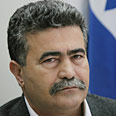
Defense Minister Amir Peretz
צילום: דודי ועקנין
Appointment crisis: Senior officers likely to resign
Defense Minister Amir Peretz's decision to delay round of appointments for IDF General Staff until hearing from those investigating military performance during war in Lebanon causing stir in IDF. Military sources warn that move could be interpreted as vote of no confidence in chief of staff
There is high tension among the IDF elite in light of Defense Minister Amir Peretz's decision on the round of appointments to be made soon. Following Peretz's announcement that he had decided to delay the issue and not to automatically authorize the appointments, the word in the IDF is that if the appointments are not authorized, "officers will announce their immediate resignation."
IDF sources warn that such a step is likely to be perceived as a vote of no confidence in the chief of staff.
Peretz's decision is expected within a week after he met with Army Chief Halutz Tuesday night. The chief of staff presented his justifications and considerations for his decisions on making the appointments, most notably of the four commanders who commanded divisions during the war in Lebanon.
After the meeting, Peretz announced his decision not to be a rubber stamp and that he would examine each appointment to the core.
A senior military source said to Ynet, "If Peretz decides to change the chief of staff's and the generals' decision, it is almost certain that the very officers for whom the decision was changed won't continue in the IDF and will announce their immediate resignation.
"These officers were backed up by the chief of staff and the generals and won't be able to continue in the IDF if the defense minister decides otherwise. Furthermore, if the defense minister's decision includes the entire round (of appointments), the chief of staff's position will also be undermined. This is likely to bring about a very difficult situation in the military," said the source.
Halutz didn't want to shock system
IDF sources explained that one of the central considerations leading to the chief of staff's decision not to dismiss the four division commanders, Brigadier General Guy Tzur, Brigadier General Gal Hirsch, Brigadier General Erez Zuckerman, and Brigadier General Eyal Eisenberg, stemmed from the desire not to shock the system and to instill trust in the commanders."If Halutz had chosen not to transfer Brigadier General Hirsch and Brigadier General Tzur to other positions and to leave the two other company commanders in their positions, they would have immediately resigned."
Halutz decided to promote Brigadier General Gal Hirsch and Brigadier General Guy Tzur – commanders of Division 91 and Division 162 during the war – even though investigations of the war found significant shortcomings in their commanding and in the functioning of the forces they commanded.
During this round of appointments, Hirsch is supposed to be appointed head of the Strategy Department of the Planning Directorate and Tzur is expected to be appointed to command the training facility in Tzeelim.
However, the criticism accompanying the announcement of their promotion apparently sent up a red flag for the defense minister. In conversations with the chief of staff Tuesday, Peretz announced that he intends to delay the appointments until he hears from General Yoram Yair and General Moshe Ivri, who have investigated the army's management during the war.










